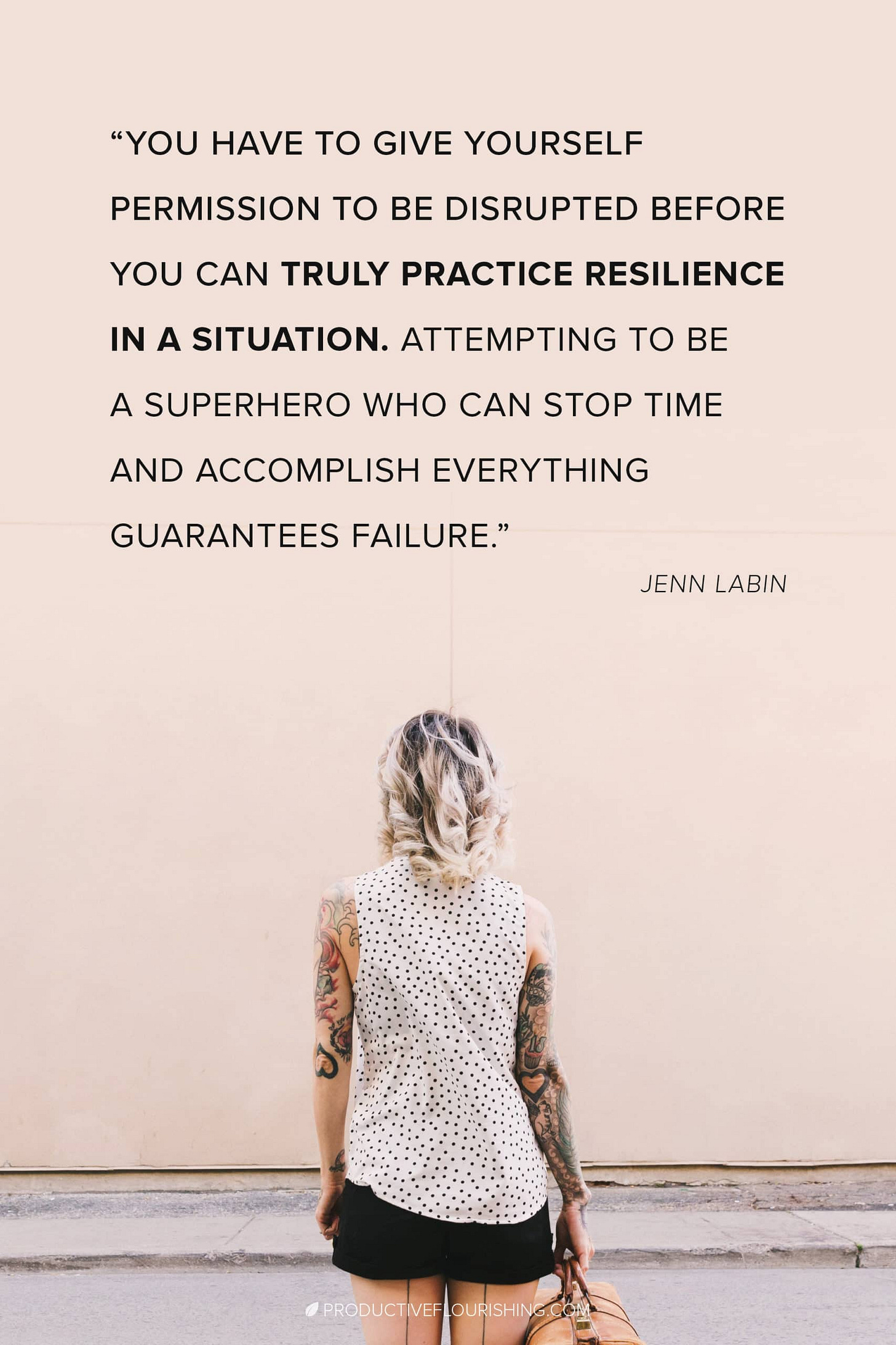How to Overcome Major Disruptions in Your Work Life

Editor’s note: This is a guest post by Jenn Labin.
Major disruptions to our work lives can take any number of forms. You might get sick, married, start a certification class, or begin taking care of your parents. Your partner may go through a rough patch at work, or you might lose a loved one or get a new pet.
Each experience is uniquely felt in terms of how much of an impact it has on our lives. For example, I’ve known people who have continued to work throughout treatment for major illness, and people who could not get out of bed when they had the flu. Some people throw themselves into their work right after a major loss, whereas others need time to heal before they are able to function at work. Large or small, positive or negative, planned or unplanned, personal experiences can wreak havoc on our productivity at work. However, the key to recovery from each disruption is resilience.
Keep Context in Mind
Keep in mind, our ability to bounce back from chaotic personal events depends on the context of the rest of our lives in that moment. Let me give you an example. A few years ago, my pet turtle died. I cried like a baby and had a hard time working for two weeks. Yeah, you read that correctly … My turtle. Died. I explained he was special — I had had him for 13 years — but seriously, my reaction was pretty intense for just losing an amphibian. However, there was a context to consider. I had lost two family members in the previous few months. Both were from my deceased mother’s side, and the last connection to my maternal family. After I lost them, I didn’t lose a single day of work. But losing Godzilla, my turtle, apparently was too much. That loss, coupled with the others, built up to a major disruption to my professional capability that was difficult to explain to others.
When I talk to Creative Giants about situations, whether negative or positive, that disrupted their professional lives, there are common themes of guilt, regret, overwhelm, anxiety, and resentment. We may feel guilty that we aren’t recovering as quickly as we think we should, or feel pressure from those around us to handle the disruption differently. The work of bouncing back professionally from these situations comes through practicing resilience, planning for anticipated disruptions, carving out time for yourself when recovering, and communicating your needs to those around you.
The Role of Resilience
Many of the resources on the internet are focused on how you endure disruption, trauma, or stress while it’s happening. While I think it’s important to be resilient during times of stress, there isn’t enough talk about recovery at work after you’ve recovered from the disruption. Also, advice like “take care of yourself” and “talk to a friend” is prominently featured when discussing turbulent times. Important guidance, to be sure, but not nearly helpful enough when considering how you bounce back from disruption and climb back into productivity.
I first started noticing how important a recovery plan was when my niece was born in 2016. We spent a harrowing couple of months while medical staff did all they could to keep the pregnancy going as long as possible. My niece was born 12 weeks early and had to spend the first three months of her life in the NICU.
I spent that time trying to support her parents and visiting when I could, but I found myself occasionally feeling overwhelmingly anxious in the middle of the work day, worried I was missing some important moment. Keep in mind, the pregnancy and birth wasn’t even my own disruption, but her parents’ distress and the concern for my niece was a major disruption to my work. (She’s healthy and amazing at 3.5 years now by the way!) Over those three months, my productivity waxed and waned. At the end of them, I knew it was time to be intentional about recovering from the experience.
Anticipate What You Can
In precious few situations can you predict the impact of some disruptive experiences. You can do a little preparation when you can see the disruption coming. For example, you can prepare for a grandparent whose health is steadily declining, the final stages in the adoption process, or a kitchen renovation.
Each of these experiences is a kind of project, albeit a personal one, and should be given the same level of planning. Let’s say you’ve got a vacation coming up. You’ve planned out where you’re going to stay and how you’re getting there. What about planning ahead to make sure enough work is done before you leave so that you aren’t stressed about impending deadlines the entire trip? Have you prepared a team member or colleague to be an emergency contact for your work? Most importantly, how will you deal with the cascade of work that awaits you when you get back?
The bigger the disruption, the more time you should spend thinking about what needs to happen before, during, or after the event to practice resilience. When I had an impending minor surgery on the horizon, I set aside one hour each week, for three weeks to review my pre-surgery workload, emergency contacts, and recovery plan. Gratefully, I was able to get back to work several days sooner than I had anticipated, but I prepared to be out of work for much longer.
I’ve found Productive Flourishing’s project planners to be helpful here in thinking through the impact of disruption. They provide a framework for considering each aspect of my work life that could be impacted, and create a method for action-planning resilience.
Permission to Recover
It often takes people by surprise just how much of a disruption even minor events can be. Have you ever had to take a child to the doctor or a pet to the veterinarian unexpectedly in the middle of the work day? Sure, the medical visit might only take an hour or two. But the unexpectedness of the event disrupts everything. You have to reschedule work meetings and figure out when you’re going to get the work done you had planned to do in that time, which might push other work back. Also, even a simple doctor visit might require lab tests, picking up prescriptions, administering medicine over 7-10 days, and a follow-up visit, creating a cascade of work disruptions that echo for sometimes over a week.
Many of us have “magical thinking” when it comes to our own productivity. I can’t tell you how many times I’ve had a mid-day emergency pediatrician visit and thought, “Oh, I’ll just work after the kids go to bed.” HAH. By that time I’m exhausted from both trying to care for my sick kid and being stressed about pending work. If I attempt to be productive late at night, I know it’ll be difficult, and I certainly won’t do my best work.
The truth is, you have to give yourself permission to be disrupted before you can truly practice resilience in a situation. Attempting to be a superhero who can stop time and accomplish everything without missing a step guarantees failure. (Tweet this.) If you can’t admit to yourself that the experience is going to have an impact, you will lack the intention and awareness to climb back to productivity. If you are intent on somehow magically getting 15 hours of work done in a three-hour space of time, there is no way to plan how to complete quality work effectively.
Make Space for Your Happy Place
After a disruption, there’s pressure to dive back into work with all of your energy as soon as possible after experiencing a disruption. However, you likely need to reserve a small amount of time for the activities that give you energy and lift your spirits to avoid burnout.
A great example is the common phrase, “I need a vacation from my vacation.” You might have had an experience where you go on holiday and, upon returning, feel overwhelmed by work and life responsibilities. Hopefully, you’ve had a wonderful and recharging trip. Don’t undo the good by draining your energy reserves working over time after you get back! Instead, plan appropriately before, during, and after the trip, and make space for your happy place.
Whether your disruption is from a positive situation, like a vacation, or something more traumatic, carve out time for those activities that bring you joy during your recovery. Angela Wheeler from Clarity Coaching does a great exercise with her clients where they make a list of activities that brings them joy and gives them energy. You should do the same thing. Keep the list somewhere you can access it when you need a reminder of things you can schedule into your day to keep the stress at bay. Try to identify a spectrum of activities that encompass physical (yoga, swimming, hiking), intellectual (reading, researching, writing), creative (painting, knitting, cooking), spiritual/emotional (meditation, going to a religious service), and social (going out with a friend, playing games, cooking with family). When you need to find an activity that will bring you joy during your recovery, you have lots of choices.
Communicate
Finally, make sure you communicate about your plans, process, and needs while you’re trying to bounce back to productivity. You do not need to, and should not, share every bit of detail with everyone in your life, but acknowledging and owning the disruption will help others understand why you may not be as responsive or on top of things as usual. Their acceptance and flexibility will also help you give yourself grace during your recovery as well.
A little forethought in what should be communicated with whom when it comes to your situation will alleviate a lot of stress. Team members collaborating on current work projects will need to have some expectations of when you will be back and ready to engage, and whether you will be coming back full time or ramping up slowly. It may also be helpful to determine an appropriate out-of-office email message for customers and colleagues that only gives a brief overview and request for patience:
“Thank you for your email. I am currently out of the office on bereavement leave and do not have access to email. I will process requests as soon as I am able. If this is an urgent matter, please reach out to my colleague…”
In my experience, customers and clients are more understanding and patient when they understand the disruption is potentially a large one (e.g., marriage, children, loss, surgery) but don’t always respond well when you divulge too much detail (e.g., “I’m having hernia repair surgery and can’t lift anything over 20 pounds for 6 weeks!”). So be careful about what you share.
It’s also fine to not share anything with customers. Just notify them that you are out of the office and may delay work. Be prepared, though; they may not have as much patience if they have to make assumptions about why you aren’t being responsive.
There’s No Secret Formula
There’s no secret formula to getting back to full capacity at work quickly after a disruption, because the individual circumstances leading to disruption vary wildly. And, our individual perspectives and experiences influence how we react to each disruption within the context of everything else going on in our lives. Your situation is unique and there is no right or wrong way to recover from professional disruptions, whether they result from positive or negative events, or whether they have a large or small impact.
If you have the opportunity of anticipating a disruptive situation before it happens, use tools like Productive Flourishing’s project planners to manage your recovery. Give yourself permission to recover at your own speed, and reject feelings of guilt or pressure about what others think the recovery should look like. Be graceful and forgiving of your needs during this time, just as you would if your best friend was going through the same situation.
During recovery don’t expect to dive head first into work without coming up for a breath of air. Be intentional about conserving some of your energy for activities that recharge you. Yes, in the short term it may feel counterproductive to spend 20 minutes meditating when you could be answering emails, but afterward you will feel better and work better than if you try to push forward out of sheer grit.
Finally, remember your recovery will impact others in terms of your responsiveness, delayed work product, or even workload for team members. Be sure to share the right amount of expectations with work partners so that everyone has expectations for your road back to productivity, and so that they can be prepared to support you if needed.





